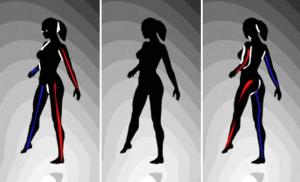Where to take a psychological test. Clinical tests to determine the level of depression and anxiety online
Theoretical and practical psychology is a science of incredible depth, allowing us to understand the secrets of human consciousness. This science never stops and improves every day, delving deeper and deeper into the study of the human personality and its behavior.
Tests in psychology are one of the methods for studying the human mind. To date, the types of testing are difficult to accurately calculate. A wide variety of questionnaires allows anyone to understand themselves and learn many secrets of their personality without directly contacting a specialist.
It is important to note that there are psychological tests for women and men separately, but we will consider the general method of tests in psychology, which is not divided by gender. Let's figure out the secrets of our consciousness together.
Where is psychological testing used?
Psychological tests with answers are used in the following cases:
- To establish the characteristics of human personality.
- Psychology tests for students help determine the future specialization of the younger generation.
- As a method to help determine the specifics of a child’s development.
- If necessary, confirm the professional suitability of the subject.
- To confirm mental health.

In fact, testing in psychology is a huge area, and they are used in different areas. But we will focus on the first task - personality traits - and will try to study the personal characteristics of each person as accurately as possible.
Eysenck test
Personality psychology tests occupy a large area in this science. The first questionnaire that you should take in order to better understand yourself is the Eysenck test, or, in other words, a study of human temperament. There are 4 main types of temperament: phlegmatic and melancholic. How to pass psychological tests? To determine which type you belong to, you should answer the following 57 questions. You only need to answer “yes” or “no”.
- Do you like to be in the epicenter of activity and bustle?
- Do you tend to feel anxious because you don't know what you want?
- Are you one of the people who won't go out of their way to say anything?
- Are you prone to unreasonable mood swings?
- Do you try to avoid noisy parties and holidays, and if you attend them, do you try to be as far away from the center of attention as possible?
- Do you always do what is asked of you?
- Do you often find yourself in a bad mood?
- In quarrels, is your main principle silence?
- Does your mood change easily?
- Do you like to be around people?
- Does it ever happen that you can't sleep because of anxious thoughts?
- Would you be considered stubborn?
- Are you considered dishonest?
- Do they say about you that you are a slow-witted person?
- Is the best job done alone?
- Is a bad mood a frequent and unreasonable guest?
- Do you consider yourself an active person in the very epicenter of life?
- Can they make you laugh?
- Do you ever experience a situation where you are completely fed up with something?
- Do you feel confident only in familiar and comfortable clothes?
- Do you find it difficult to concentrate?
- Do you have problems expressing your thoughts in words?
- Do you often get lost in personal thoughts?
- Are you a person who rejects prejudice?
- Do you consider yourself a fan of practical jokes?
- Are your thoughts mostly about work?
- Is it important for you to eat tasty food?
- When you want to talk, is it important that your interlocutor is in a good mood?
- Don't like to borrow?
- Do you tend to brag?
- Do you consider yourself sensitive to anything?
- Do you prefer a home gathering alone than a noisy holiday?
- Do you have severe anxiety?
- Are you making plans much earlier than necessary?
- Do you experience dizziness?
- Do you respond to messages immediately?
- Do things work better when you do them on your own than with a group?
- Do you experience shortness of breath even without exercise?
- Do you consider yourself a person who can calmly deviate from generally accepted rules (within the norm)?
- Worried about the state of your nervous system?
- Do you like to make plans?
- Is it better to put off until tomorrow what can be done today?
- Are you afraid of confined spaces?
- Are you proactive when you first meet a person?
- Do you get severe headaches?
- Are you a believer that many problems can be solved on their own?
- Do you suffer from insomnia?
- Tendencies to lie?
- Does it ever happen that you say the first thing that comes to mind?
- When you find yourself in a stupid situation, do you often remember it and worry about it?
- Are you closed?
- Do you often find yourself in unpleasant situations?
- Are you an avid storyteller?
- The main thing is not victory, but participation - isn't that about you?
- Are you uncomfortable in a society where people are higher than you in social status?
- When everything goes against you, do you continue to act?
- Are you very nervous before an important task?
Now let's check the key.
Key to the test
We will determine it based on several factors: extraversion - introversion, the level of neuroticism and the lie scale. For each match with the answer, 1 point is awarded.
Extraversion - introversion
Answers "yes": 1, 3, 8, 10, 13, 17, 22, 25, 27, 39, 44, 46, 49, 53, 56.
Answers “no”: 5, 15, 20, 29, 32, 34, 37, 41, 51.
As you noticed, some question numbers are missing. This is not a mistake, this is how it should be. Let's check the key to this point. Take a look at the circle (see picture below) - the horizontal line indicates the extraversion - introversion scale. The higher the score on this trait, the more prone you are to extraversion and vice versa. The number 12 is the average.

Neuroticism scale
The neuroticism scale on the same circle has the designation stability-instability. Only “yes” answers need to be verified here.
Yes answers: 2, 4, 7, 9, 11, 14, 16, 19, 21, 23, 26, 28, 31, 33, 35, 38, 40, 43, 45, 47, 50, 52, 55 , 57.
The Neuroticism Scale helps determine the resilience of your nervous system. It is located vertically and must be worked with in the same way as in the previous paragraph.
Lie
The lie scale is not displayed on the circle, but several questions are specifically highlighted to determine it.
Answers “yes”: 6, 24, 36.
Answers “no”: 12, 18, 30, 42, 48.
It is worth noting that when answering such psychological tests with answers, you must first of all be extremely honest with yourself. The key to this scale is as simple as possible: if you score more than 4 on this item, it means that you have been insincere in some areas. A mark of 4 and below indicates the norm in the answers.
In some interpretations, there is a division between psychological tests for women and men, since the fair half of humanity is more prone to emotionality, which may have a minor impact on the test results.
Explanations for the Eysenck circle
The tests end with a determination of our temperament type. Look at the circle again and find the intersection point of your two previous marks. The new (third) point will be located in the quarter, symbolizing the type of your temperament.

Sanguinistic
People of this temperament are considered cheerful. They are often the leaders of the group and lead people, exuding activity and movement. The mood of these people is always positive, it is easy for them to make new acquaintances, they feel comfortable among a new circle of people.
Sanguine people need constant change and novelty. This is a real need, because if you force a sanguine person to do a tedious task for a long time, his cheerfulness will fade, the person will become lethargic and inactive. That’s why such people easily move from place to place and make new acquaintances.
Phlegmatic
Phlegmatic people are calm people. It is difficult to piss them off and force them to show their emotions. Phlegmatic people control all their actions, they rarely lose sight of something and think about their every step.
It is not so easy to influence the change of mood of a phlegmatic person due to their composure. But people of this temperament need to try to be more active and avoid being overly immersed in their thoughts, which can lead to a bad mood.
Choleric
Cholerics live in outbreaks. Their emotions can change at the drop of a hat, as can ups and downs in activity. Such people take on any task, but sometimes cannot complete it due to lack of energy.
Cholerics are emotional and hot-tempered, so they can easily quarrel with anyone. Such individuals need more control over themselves.
Melancholic
The mental processes of melancholic people proceed extremely slowly. It is almost impossible to bring these people out of their state of mental balance. Such a person feels uncomfortable in a large company; in a group their performance decreases. A melancholic person is more comfortable working alone.
Such a person is frightened by something new. Melancholic people rarely share their experiences and keep everything to themselves.
This type of temperament can end there. Your first step into self-knowledge has been completed. Let's look at interesting psychology tests further.
Luscher test

Psychological tests based on colors are widely used by specialists not only with children. They are no less informative for assessing adult personalities. This test in psychology is a way to understand your current state of mind. The Luscher questionnaire is based on 8 colors. There are many interpretations of this study, as well as variations of the most interesting test in psychology. But we will focus on a short, but no less accurate version:
- Prepare a sheet of paper and a pen.
- Take a look at the picture (above). Before you are 8 colors. You need to choose the most preferred and pleasant color for you at the moment. Please note that you do not need to correlate the color you choose with your favorite color in clothing, surroundings, fashion trends, etc. Your choice should be as impartial as possible and independent of your personal preferences. You make a choice only based on your current desires.
- Next, you need to continue your choice according to the same principle: you choose the most pleasant color from the remaining ones. Write down the order of choosing colors on paper.
This completes the first stage. But we don’t stop there and move on to the second stage:
- Let's use a new piece of paper and pen again.
- It may surprise you, but we are repeating the same procedure again. There are again 8 colors in front of you, and you begin to choose the most pleasant color one by one. You should not try to correlate your previous and current choices - mark the pictures as if you were seeing them for the first time.
We have now completed the psychological testing. Why was it necessary to carry out the same procedure twice? The answer is simple: your first choice (quite often this test is used to assess personality in psychology) is what you want. The second stage reflects reality, which may differ from your desires. Let's move on to interpretation.
Let's define what each position means:
- The first value you choose determines the means by which you achieve your goal. It doesn’t matter whether you have any specific intentions at the moment, because we are studying what is embedded in your subconscious right now.
- The second position characterizes the very goal that we are achieving.
- Next we consider pairs of positions. Numbers 3 and 4 characterize your feeling about the current situation.
- The 5th and 6th positions are a reflection of your neutral attitude towards these colors. In certain situations, these positions can carry considerable significance, since they reflect an action or need that you deliberately put on the back burner until better times;
- Numbers 7 and 8 are what you have a strong antipathy towards.
Once you understand what each number means, you can move on to specific definitions.
Meaning of colors
First of all, we can divide all the colors used into two groups - main and additional. The main group includes blue, blue-green, orange-red and light yellow. In a normal state of consciousness of a person and his peace of mind, the absence of internal conflicts, these colors occupy the first 5 positions.
Additional shades - purple, black, brown, gray. These colors belong to the negative group, which reflects hidden or obvious fears, anxiety, and dissatisfaction with the situation.
Blue is a symbol of calm and contentment. Finding it in first place at the initial stage of our test indicates a person’s need for a state of peace and absence of tension. In the second option, symbolizing reality, choosing blue is the most favorable outcome. It reflects that at the moment you are mentally peaceful.
Blue-green. The color represents confidence and stubbornness. The position of this color indicates that you, to one degree or another, need confidence in yourself and in your environment. If this color is located in the last positions in the second test, this indicates a weak personality and the need for human support.
Orange-red is the color of action, excitement and sometimes aggression. Depending on the location, it speaks of a state of readiness for active action and combating problems.
Light yellow is the color of fun and sociability. In a duet with blue it gives the most successful combination.
Psychological color tests will help you create an accurate picture of your current state of mind.
Optimist, pessimist, realist

Let's consider the last, but no less interesting test in general psychology. It will finally allow you to determine who you are - a cheerful optimist, a saddened pessimist or a wise realist. You must answer only “yes” or “no” questions:
- Are you interested in the opportunity to travel?
- Do you love learning something new?
- Do you have problems sleeping?
- Are you a hospitable person?
- Do you tend to predict problems in the future?
- Have your friends achieved more in life than you?
- Do you like to play sports?
- Does fate often give you surprises?
- Are you worried about the current state of the environment?
- Has scientific progress caused too many problems for the planet?
- Is your profession chosen well?
- How often do you use insurance?
- Are you a mobile person? Is it easy for you to move to another place if you are offered a job you like?
- Do you think you're cute?
- Are you worried about the condition of your body?
- Doesn't it bother you to be in an unfamiliar group?
- Do you like to be in the center of events?
- Is there friendship without mutual benefit?
- Do you have your own personal signs?
- Does everyone build their own destiny?
Having answered 20 fairly simple questions, let's move on to the key.

For each match to the key we give ourselves 1 point.
Answers “yes”: 1, 2, 4, 7, 11, 13-20.
Answers “no”: 3, 5, 6, 8, 9, 10, 12.
0-5 points. You are definitely a pessimist. Moreover, you are clearly exaggerating your hardships and problems, because life is full of black stripes, but not without white ones, but you see everything in black. Look at life differently - the world is not as gloomy as you think.
6-10 points. You are upset about what is happening. Everything around you is going wrong, although you continue to struggle. Life keeps bringing new surprises, and your friends cope with them better than you. Yes, you are pessimistic about life, but you have reasons for this. However, you shouldn’t be so upset about minor losses and life’s troubles - you are coping well and going in the right direction.
11-15 points. Your outlook on life is obvious and real. You do not exaggerate your sorrows, but you also do not get drunk with the joy of victories. Your attitude in life can be envied, because you are a realist and look at life with confidence. Keep up the good work and don't give up!
16-18 points. You are an optimist, you see your advantages in any problem and try to turn any situation to your advantage. Adversity does not pass you by, but you know how to treat it correctly, your life shines with colors.
19-20. We need to look for an optimist like you. You don’t see any problems, the whole world is a complete rainbow for you. But maybe it’s worth looking at life without rose-colored glasses? After all, sometimes frivolity leads to sad consequences.

Thus, we have completed tests on personality psychology. Of course, three questionnaires are not enough to understand the deep world of a person, but you have already embarked on the path of self-knowledge and have learned a lot about your character traits and state of mind.
But do not forget that a test in psychology is not a simple magic wand that everyone can use. Only a psychologist can provide accurate information. Interesting psychology tests are just an additional method of personality research. They provide only a current snapshot of the quality being studied. And many psychological tests and questionnaires stored on the Internet do not reflect reality at all.
Nowadays you can find thousands of psychological tests on the Internet, but their results are often disappointing: inaccurate or too general. You simply look for words in the text that are pleasant for you - and it seems that they were written about you.
Our selection of tests is approved by the psychological community. You can truly trust the results. In addition, these tests are difficult to fool and predict the result.
Luscher test
Color selection technique. This test, invented by Swiss psychologist Max Lüscher, quite accurately determines your psychological state in which you are now. This test describes what a person really is like, since the choice of color is based on unconscious processes.
Szondi test
Portrait selection method. The technique was developed in the 30s of the twentieth century by the Viennese psychologist Leopold Szondi. He discovered a certain pattern that governs a person’s selectivity in communicating with others. The unconscious choice of certain facial features, in his opinion, determines some of one’s own character traits, personality traits, and even a predisposition to mental illness.
Cattell Questionnaire
Cattell's 16-factor personality questionnaire is one of the most common questionnaire methods for assessing individual psychological characteristics of a personality both abroad and in our country. This test allows you to look at personality from different angles. The questionnaire is quite large, so you will have to allocate special time to complete this test in its entirety.
The short orientation and selection test (BOT) is designed to diagnose the general level of intellectual abilities. This test is often used in hiring for leadership positions, intelligence agencies, the military and other fields. CAT allows you to diagnose a person’s ability to acquire new knowledge and activities.
Projective drawing test
In general, there are many projective techniques. You need to use your imagination and complete the proposed figure. We offer a simple and quick test.
- Luscher test
- Szondi test
- Cattell Questionnaire
- Short Orientation Test (SOT)
- Projective drawing test

Galina Ilya Yurievich! Thank you very much for your sessions, which I was lucky enough to take part in. Thanks to them, I have become more confident in many issues and situations that previously caused anxiety and concern. You taught me how to deal with this in a short period of time. It's a pleasure to deal with a high-level professional!
Anna Ilya Yuryevich, it is difficult to find words to express my gratitude to you for your help. I remembered in what state and with what thoughts I met last year, 2017. I remember those feelings of bitterness and anxiety that did not leave me under any circumstances. Finally, I left this desire for self-destruction and now I can breathe differently. Thank you!
Tatiana Thank you, Ilya Yurievich, for the consultation. Indeed, she allowed me to look at my life situation from a different angle. Thanks again!
Vladimir Thank you very much for the consultation! Indeed, I noticed that memories pop up at times when I was in a bad mood or irritable, but I could not understand that this was a defense mechanism. The next time he appears, I’ll try to talk about what exactly causes irritation, instead of plunging into memories.
Daria Many thanks for the help! I am very glad you helped me understand myself and showed me a new path to improve my life!













